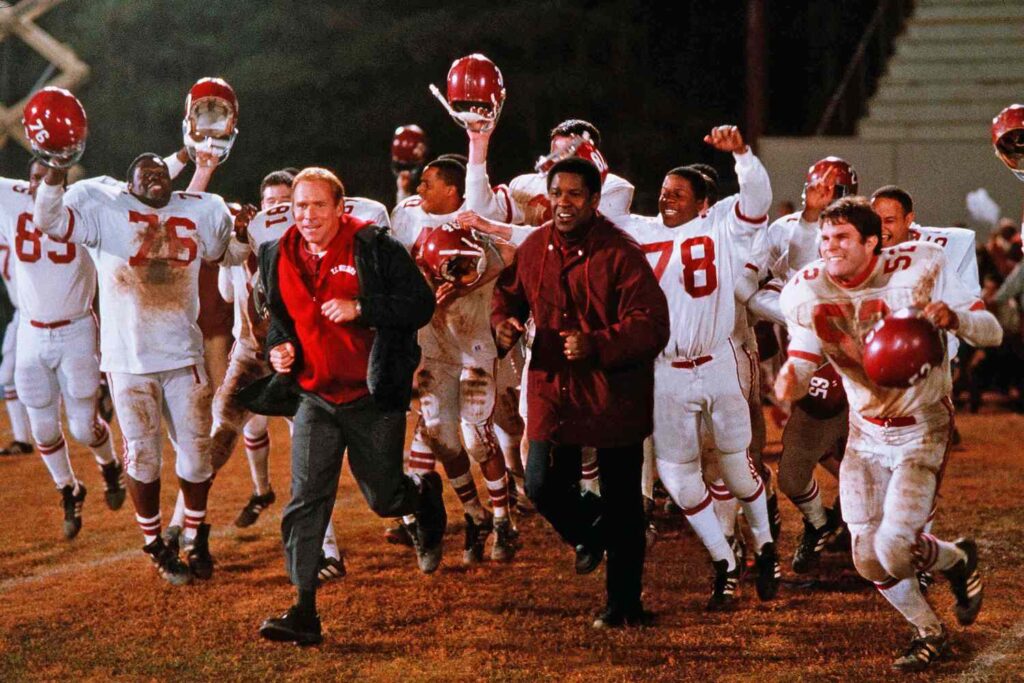NEED TO KNOW
Remember the Titans took the world by storm 25 years ago.
The classic film — which premiered on Sept. 29, 2000 — is based on the true story of football coach Herman Boone (Denzel Washington) and the newly-integrated team at T.C. Williams High School in Alexandria, Va., in 1971.
In real life, the real T.C. Williams High School had already been integrated by 1971, since it had opened in 1965. According to Northern Virginia Magazine, the football team was shaken up when the city of Alexandria moved students around from different high schools, effectively combining three different junior and senior classes. Three varsity teams needed to be consolidated into one, causing a lot of competition and rivalry.
Around this time, Boone took on the head coaching job alongside assistant coach Bill Yoast (Will Patton). Other scenes in the film are accurate, as well: The team’s captain Gerry Bertier did get seriously injured in a car accident and Bill’s firecracker daughter Sheryl Yoast (Hayden Panettiere) did indeed exist.
That said, the film was “not a documentary,” producer Jerry Bruckheimer told The Washington Post in September 2020, with screenwriter Gregory Allen Howard adding, “You just have to maintain the spirit of the piece. You can change a bunch of the s—, but you can’t violate the spirit.”
Here’s everything to know about the real-life team and coaches that inspired Remember the Titans.
Who was Herman Boone?
Eric Charbonneau/Berliner Studio/BEImages/Shutterstock
Boone was an American high school football coach. Before getting a job as an assistant football coach at T.C. Williams in 1969, Boone coached at E.J. Hayes High School in North Carolina and won four state titles, per ESPN. When the school board there told him they weren’t ready to hire a Black head coach, he resigned and went to T.C. Williams.
In 1971, Boone was named the head coach of the Titans, a decision that came as a surprise to many — Yoast had years of seniority there and was expected to get the job, per ESPN.
In the film, Boone is depicted as a disciplinarian who values hard work, pushes his players to be the best they can be and rarely smiles. Bill told ESPN that this did capture some of Boone’s personality, saying he “was a perfectionist” and “had a temper and was in your face a lot.” However, he added that Boone had a more warm side that wasn’t portrayed.
According to The New York Times, Boone retired from coaching in 1979, although he continued to teach physical education and went on to coach golf. In 2016, he was awarded the Living Legends of Alexandria award.
Boone died at age 84 at home in Alexandria in December 2019 from lung cancer, per his obit.
Who were the Yoasts?
Eric Charbonneau/Berliner Studio/BEImages/Shutterstock
Bill was the defensive coordinator and assistant to the head coach for the Titans in 1971. He was born in Alabama and taught and coached at a school in Georgia before going to T.C. Williams.
When Boone was hired as the head coach over Bill, Bill was upset enough to consider taking some time away from coaching. In the DVD commentary of the film (via ESPN), Bill said that similarly to the movie, some of the players petitioned to get him named as head coach, adding, “They did have something to do with me finally agreeing to go with Herman.”
In the film, Bill is married with one daughter, Sheryl. In reality, Sheryl was one of four daughters. In the DVD commentary of the film (via ESPN), Bill said that while Sheryl did go to all of the football games, she was “not quite the football fanatic” she seems to be in the movie.
Although she was “very angry” when Boone was named head coach over her father, “she was never quite as aggressive as they depict her in the film,” Bill added.
Bill coached at T.C. Williams from 1971 until 1996. He died in 2019 at age 94. Sheryl died in 1996 at age 34, per ESPN.
Were the Titans a real football team?
Jahi Chikwendiu/The Washington Post/Getty Images
The Titans were a real football team at T.C. Williams, and they did indeed win the state championship.
However, the inception of the team was not quite the same in real life as it was in the film. In the movie, the Titans came together when two high schools — one of all Black students and one of all White students — were integrated into one.
The reality was a little different. In 1965, T.C. Williams opened as Alexandria’s third high school, all three of which were already integrated. In 1971, in response to a Supreme Court decision on busing, the city of Alexandria moved students from all of these high schools around, per Northern Virginia Magazine. All juniors and seniors ended up at T.C. Williams, and three football teams were combined into one: the Titans.
In the movie, the Titans are kind of seen as a team of underdogs, with Boone facing a lot of pressure to get them to win. However, in real life, the Titans were an impressive team full of all-star players. According to Northern Virginia Magazine, they were “outscoring opponents 265-31” and were even ranked second in the nation.
Many of the players in the movie were fictional, but a few were based on real people. Gerry Bertier (Ryan Hurst) was the captain of the Titans. Ronnie “Sunshine” Bass (Kip Pardue) was also a real player who moved to Virginia from California. However, he wasn’t as much of a hippie as the movie made it seem.
“I was never quite like that,” he told The Greenville News in September 2000. “I’ll say for the record my hair was never that long.”
Julius Campbell (Wood Harris) was another real-life Titan. He died in 2019 at age 65 of organ failure.
In the film, Campbell is portrayed as Bertier’s close friend who helps him bring the team together, and this appears to be close to fact. “Julius took it upon himself to lead the team and rebuild race relations,” Boone said, per The Washington Post.
Other real players included Petey Jones (Donald Faison) and Louie Lastik (Ethan Suplee).
Was Gerry Bertier really paralyzed?
Gerry Bertier was a high school football player, the captain of the Titans and a Paralympian. He died in March 1981 after complications from a car crash.
One of the saddest parts of Remember The Titans is when Bertier got into a car accident that left him paralyzed before their last game. This also happened in real life — just during slightly different circumstances. On the way home from the team banquet after the 1971 season had ended, Bertier got in a car crash that left him paralyzed from the waist down, per the Titans website.
He went on to attend Northern Virginia Community College and continued his athletic career as a participant in the Paralympics.
The real-life Bertier was just as much of a powerful force in reality as he was portrayed in the film. In a 2000 interview for the Albuquerque Journal (via ESPN), a friend described Bertier as “a team leader,” saying, “He should have been bigger in the movie. He was fast and powerful, like no high school player I’ve ever seen.”
On March 20, 1981, Bertier was in a second car crash in Virginia on his way home from a business trip. He collided with a car that crossed the center line and later died in the hospital from his injuries, according to The Washington Star.
In 2006, Bertier’s family started the Bertier #42 Foundation, which is dedicated to raising money for research on spinal cord injuries.
Was there racial tension on the T.C. Williams football team?
Moviestore/Shutterstock
In addition to the team being real, there were racial tensions in the city of Alexandria in 1971.
According to Northern Virginia Magazine, Friday night football games had been canceled in 1969 because of vandalism and racial tension. In 1970, a Black teenager named Robin Gibson was shot and killed by a White 7-11 employee, a tragedy that resulted in a three-night riot.
In the movie, racial tension is particularly high at T.C. Williams and in the newly integrated football team. However, real Titans players remember that most of the rivalry and competition on the team came more from the fact that three high schools’ worth of players had been combined into one varsity team.
“When they brought the three schools together, to me, it wasn’t a question of Black or white; I didn’t like that guy because he was my rival,” former player Bob Luckett told Northern Virginia Magazine.
In September 2000, the real-life Ron Bass told The Greenville News that he felt the racial tension had been dramatized for the movie, saying, “They had a community divided down Black and white, and it wasn’t really like that in 1971 Alexandria.”
In an October 2020 interview with GQ, Harris said that he was “glad” that the film was made.
“We told the right story,” he said. “It’s like a perfect vision. You can rub your eyes and see clearly if you want to.”

